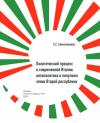Afghanistan: Negotiating Peace
| Регион: | Центральная Азия |
| Год издания: | 2011 |
| Авторы / под ред. : | Томас Пикеринг |
Описание
Издательство: The Century Foundation
ISBN: 978-0870785207
The Report of the Century Foundation International Task Force on Afghanistan in Its Regional and Multilateral Dimensions.
For nearly a decade the international community has supported Afghanistan's political, social, and economic reconstruction —and opposed the return to power of the Taliban. While Afghans have seen many improvements over that decade, there has been a Taliban resurgence across much of the country. Despite the recent increase in fighting, neither side has been able to vanquish the other militarily. Moreover, a majority of Afghans seem anxious for the contending factions to achieve a negotiated end to the war. Can this growing sense of a military stalemate help usher in a political phase to conclude this conflict?
This report, the product of an international task force led by ambassadors Lakhdar Brahimi and Thomas R. Pickering, recommends a political path toward ending the war. Peace is possible in Afghanistan, the task force members assert, if Afghans and the various international stakeholders can overcome their deep divisions and commence the serious negotiations that will be required to achieve it.
The report outlines the issues that would need to be addressed in any peace settlement: the division of power, the political order, the role of Islam, human rights, economic development, suppression of terrorist networks and narcotics, the role of foreign forces, and so on. It also presents concrete steps for moving into a political process that could achieve a negotiated settlement to the war. The task force argues that, to end this war with a durable compromise settlement, a complex and multitiered negotiating framework will be essential, and the time to start that political process is now.
Прошедший опрос
-
Какие угрозы для окружающей среды, на ваш взгляд, являются наиболее важными для России сегодня? Отметьте не более трех пунктов
Увеличение количества мусора 228 (66.67%) Вырубка лесов 214 (62.57%) Загрязнение воды 186 (54.39%) Загрязнение воздуха 153 (44.74%) Проблема захоронения ядерных отходов 106 (30.99%) Истощение полезных ископаемых 90 (26.32%) Глобальное потепление 83 (24.27%) Сокращение биоразнообразия 77 (22.51%) Звуковое загрязнение 25 (7.31%)

«Международные исследования в России»

Статистические данные по международной проблематике

Электронные журналы и библиотеки



